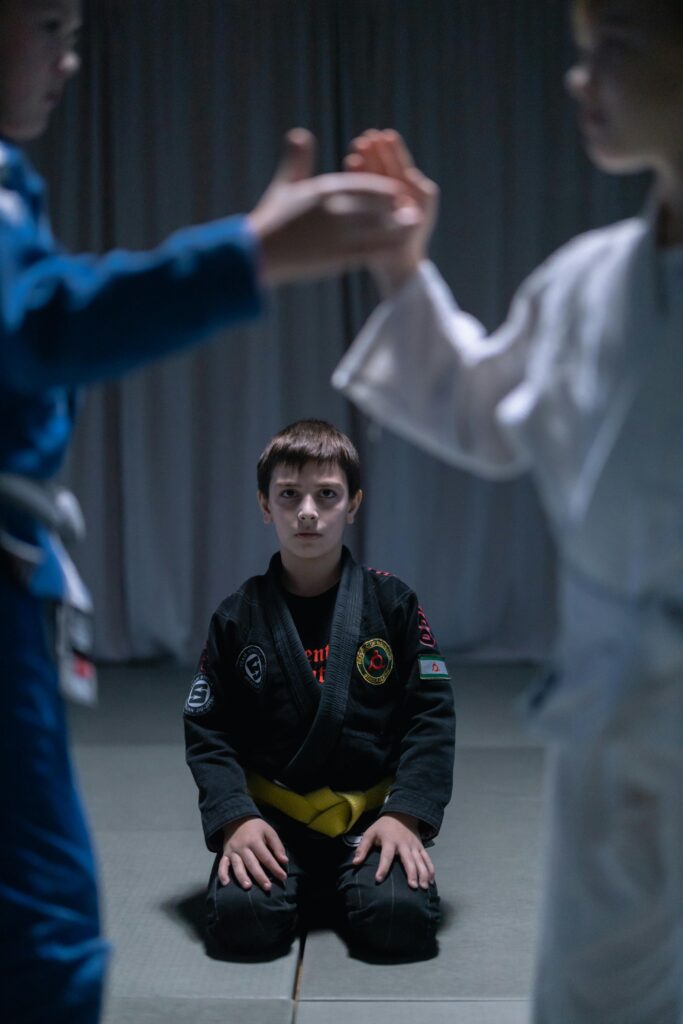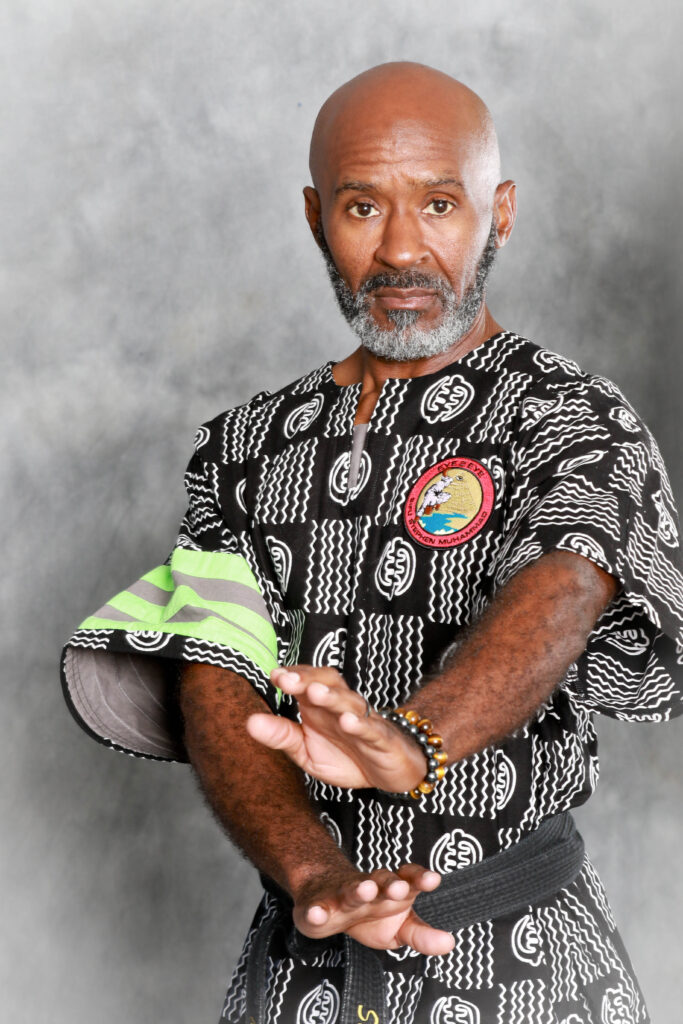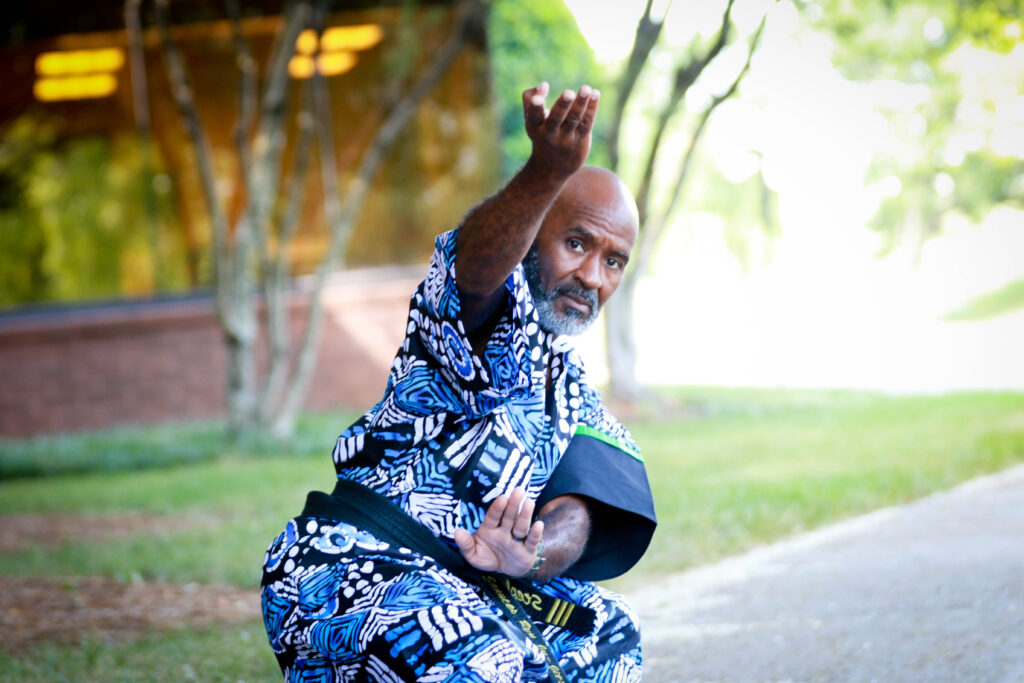If you’ve ever wondered whether Jiu Jitsu or Karate is the right martial art for you, you’re not alone. I get questions all the time about the differences between these two popular styles.
Both Jiu Jitsu and Karate have unique techniques, training styles, and benefits, but they offer very different paths to self-defense and fitness.
Whether you’re thinking about enrolling your kids in youth self-defense classes or you’re an adult looking for the best way to stay fit and safe, understanding how Jiu Jitsu compares to Karate is key to making the right choice.
Understanding Jiu Jitsu and Karate
Let’s start by getting a basic understanding of what Jiu Jitsu and Karate are all about.
What is Jiu Jitsu?
Jiu Jitsu, particularly Brazilian Jiu Jitsu (BJJ), is all about grappling and ground fighting. If you’ve ever watched a fight go to the ground, you’ve probably seen Jiu Jitsu in action—think submissions, chokes, and joint locks.
One of the best things about Jiu Jitsu is that it doesn’t matter if you’re smaller or weaker than your opponent. The techniques are designed to let you use leverage and control to neutralize a threat. It’s all about using your brain and technique, not raw strength.
What is Karate?
Karate, on the other hand, is a striking art. It’s a system of punches, kicks, blocks, and even knee and elbow strikes.
Karate practitioners spend a lot of time perfecting their form, practicing sequences called “kata,” and training their bodies to respond quickly and powerfully.
Unlike Jiu Jitsu, which focuses on grappling, Karate is all about keeping distance and using quick, effective strikes to take down an opponent before they can get too close.
Fundamental Differences
Many people often ask “What is the difference between karate and Jiu Jitsu?” The most significant difference between the two is their primary focus. Jiu Jitsu excels when the fight goes to the ground, whereas Karate is all about standing your ground and striking.
If you’re looking for a martial art where you can use leverage and technique to control a fight, Jiu Jitsu might be the way to go. If you prefer to strike fast and hard to end a confrontation quickly, Karate could be a better fit.
Techniques and Training Methods
So how do these martial arts actually train you? Let’s dive into the techniques and training methods used in each style.
Jiu Jitsu Techniques and Approach
Jiu Jitsu is known for its complex submissions, joint locks, and chokes. But the real magic is in the training.
Sparring, or “rolling,” is where you get to test what you’ve learned in a controlled but live scenario. Unlike striking arts where sparring can leave you bruised and battered, Jiu Jitsu sparring lets you go full intensity without the same risk of injury.
You’re learning to neutralize a threat by controlling their movement, which is why it’s so effective in real-world self-defense situations.
Karate Techniques and Approach
Karate focuses on striking techniques—punches, kicks, blocks, and counter-attacks. The drills can be pretty repetitive, but that’s because they’re designed to build muscle memory.
When you practice Karate, you’re training to respond instantly and instinctively in a fight. Sparring in Karate is usually more controlled than in Jiu Jitsu, especially since it’s a striking art.
But don’t let that fool you—Karate sparring sharpens your reflexes and prepares you to deliver quick, decisive strikes in real-life situations.
Training Routines and Sparring
Both Jiu Jitsu and Karate require discipline, but the training routines differ. In Jiu Jitsu, you spend a lot of time rolling with partners to practice submissions and positional control.
Karate, on the other hand, often involves kata (forms) and pad work to develop striking power and technique. Both styles have sparring elements, but they approach it from different angles: grappling for Jiu Jitsu and striking for Karate.
Applications in Real-World Scenarios
Next, let’s get into how these martial arts work in real-world self-defense situations. After all, many people turn to martial arts not just for fitness, but to feel safer and more confident in everyday life.
How Jiu Jitsu Handles Real-Life Threats
One of Jiu Jitsu’s biggest advantages is how well it works in one-on-one confrontations, especially if the fight goes to the ground.
Picture this: someone grabs you, and suddenly, you’re wrestling on the pavement. Jiu Jitsu is designed for these moments. You learn to stay calm, control your opponent, and either neutralize the threat or get away safely.
It’s no wonder Jiu Jitsu is often considered one of the most practical martial arts for self-defense.
How Karate Prepares You for Real-World Confrontations
Karate’s strengths lie in its quick, powerful strikes. In a real-world situation, you want to end the fight as fast as possible, and Karate teaches you how to do just that.
It’s about precision—one well-placed punch or kick can stop an attacker in their tracks. The focus on striking, blocking, and keeping your distance makes Karate highly effective for defending against multiple attackers or threats coming at you fast.
Choosing the Right Art for Your Environment
Choosing between Jiu Jitsu and Karate often depends on the type of environment you expect to face.
If you’re worried about close-contact scenarios, Jiu Jitsu might give you the edge with its grappling techniques.
But if you’re thinking about situations where you might need to defend yourself against multiple attackers or keep an attacker at a distance, Karate’s striking and defensive techniques might be more your style.
Physical and Mental Benefits
Now, let’s talk about the benefits you can expect from each martial art, both physically and mentally.
Physical Fitness in Jiu Jitsu
Jiu Jitsu is a full-body workout that builds endurance, strength, and flexibility. Rolling with your training partners gives you a cardio workout that’s hard to match.
Plus, because it’s so focused on technique, you’ll find that Jiu Jitsu keeps you constantly thinking and adapting. It’s as much a mental workout as it is a physical one.
Physical Fitness in Karate
Karate training develops strength, speed, and balance through repeated practice of strikes and blocks. It also builds agility and coordination.
The physical demands of Karate keep your body toned and sharp, especially when you’re pushing yourself in kata and sparring drills. It’s a fantastic way to stay fit while learning valuable self-defense skills.
Mental Discipline and Focus in Both Arts
Both Jiu Jitsu and Karate require a lot of mental focus. In Jiu Jitsu, you’re constantly solving problems—how do you escape from a bad position? How do you control your opponent? It’s like chess, but with your body.
Karate, on the other hand, emphasizes discipline and respect. The repetitive nature of the training hones your ability to focus and teaches you patience. In both arts, the mental benefits extend beyond the dojo and into your everyday life.
Karate vs Jiu Jitsu: Which Martial Art is Best for You?
Finally, let’s figure out which martial art is the best fit for your lifestyle and goals.
Lifestyle Considerations
Choosing between Jiu Jitsu and Karate depends a lot on what you want to get out of your training.
Jiu Jitsu is great if you want to learn a martial art that’s effective in real-life self-defense situations and helps you think on your feet. It’s also fantastic for people who want a physical challenge without high-impact strikes.
Karate, on the other hand, is perfect if you prefer a more structured, traditional style of training. If you want to build striking power and learn to handle fast-paced confrontations, Karate might be your best bet.
Jiu Jitsu versus Karate for Different Age Groups
Both martial arts are suitable for all ages, but they offer different things depending on where you are in life. For kids, Jiu Jitsu is great because it teaches them how to handle physical confrontations in a safe, controlled way.
Karate is often chosen for its emphasis on discipline and respect, which many parents love. For adults and seniors, Jiu Jitsu offers a low-impact way to stay in shape and defend yourself, while Karate provides excellent conditioning and mental discipline.
Budget and Time Commitment
Both arts require a time commitment, but their approaches are a little different. Jiu Jitsu may require more frequent sparring sessions, which can add to the time you spend on the mat.
Karate, with its focus on kata and repetition, might fit better into a more structured schedule. Neither art is inherently more expensive, but it’s worth checking with local schools to see what fits your budget and schedule.
Find Your Path in Martial Arts with Eye2Eye Combat’s Programs
Choosing between Jiu Jitsu and Karate ultimately depends on what you’re looking for in a martial art—whether it’s the tactical ground game of Jiu Jitsu or the striking precision of Karate.
Both offer unique benefits, from physical fitness to real-world self-defense skills, and either choice will set you on a path to personal growth and confidence.
At Eye2Eye Combat, we make it easy to explore both styles and find what suits you best. Our team of experienced instructors is dedicated to helping you unlock your potential and learn practical, effective self-defense techniques from day one.
Check out our private defense training, and let us guide you on your martial arts journey. It’s time to discover your true strength!
FAQs
What is better, Karate or Jiu Jitsu?
It really depends on what you’re looking for. If you want to learn striking and how to defend yourself on your feet, Karate might be your choice. But if you’re more interested in grappling and controlling an opponent on the ground, Jiu Jitsu is probably a better fit. Both are great for self-defense, just in different ways.
Can Karate beat Kung Fu?
It’s less about one style “beating” another and more about the practitioner’s skill level and how they use the techniques. Karate focuses on powerful, direct strikes, while Kung Fu can be more fluid and varied. In a matchup, it really comes down to the individual and how well they’ve trained.
Which martial art can beat Jiu Jitsu?
There’s no definitive answer since every martial art has its strengths. Striking arts like Muay Thai or Karate might have an advantage on their feet, but Jiu Jitsu excels in grappling and ground control. It’s really about the fighter’s experience and how they adapt to different situations, not just the style itself.
What’s better, Jiu Jitsu or Taekwondo?
Both have their strengths, but they’re very different. Jiu Jitsu is all about grappling and ground fighting, while Taekwondo emphasizes high, fast kicks and striking. If you prefer learning how to control an opponent in close combat, Jiu Jitsu might be better. But if you’re into striking and kicks, Taekwondo could be more your style.
Is Jiu Jitsu good for self-defense?
Absolutely. Jiu Jitsu is one of the best martial arts for self-defense because it teaches you how to control or submit an opponent, even if they’re bigger or stronger. Most real-life altercations end up in close quarters, and Jiu Jitsu gives you the tools to stay safe and in control.
Can you learn both Karate and Jiu Jitsu at the same time?
Yes, you can definitely learn both at the same time! In fact, they complement each other well. Karate teaches you striking techniques, while Jiu Jitsu focuses on grappling and ground control. Together, you get a well-rounded skill set that covers different aspects of self-defense and martial arts training.





